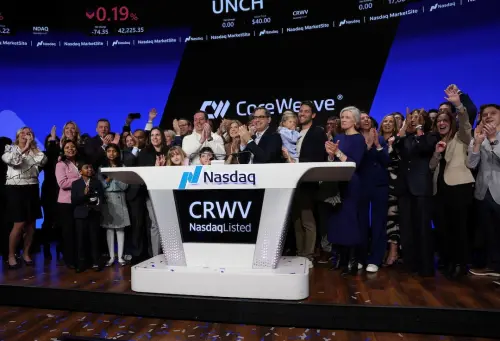CoreWeave's shares closed flat after opening nearly 3% below their offer price in its Nasdaq debut, yielding a valuation of $23 billion on a fully diluted basis. This lackluster performance raises concerns about the potential for a meaningful recovery in IPOs, particularly amid ongoing turmoil in equity markets. Wall Street witnessed a sharp decline on Friday, with the tech-heavy Nasdaq falling 2.7%.
The sentiment towards AI infrastructure may also suffer due to rising uncertainty over Big Tech's expansive spending and fears of competition from more cost-effective options, such as the Chinese AI startup DeepSeek, which requires fewer chips. CoreWeave's stock opened at $39, below the IPO price of $40, and had already faced challenges prior to the debut.
Kamran Ansari, managing partner at Kapital Ventures, questioned the market's receptiveness, noting that while CoreWeave has experienced meteoric growth, its long-term sustainability remains untested. Nvidia partially supported CoreWeave's IPO with a $250 million order, contributing to a total raise of $1.5 billion, marking the largest AI-related listing by amount raised, according to Dealogic.
Investors have previously pushed AI-related companies like Oracle and Microsoft to elevated valuations, yet both companies have seen declines of 13% and 7% this year, respectively. Concerns have surfaced among risk-averse investors regarding CoreWeave's long-term growth prospects and financial risks in a volatile market.
CoreWeave CEO Mike Intrator emphasized the necessity of infrastructure for delivering artificial intelligence, describing it as one of the true super cycles in existence. He claimed there has been no reduction in demand from clients developing this infrastructure.
Based in Livingston, New Jersey, CoreWeave provides access to data centers and high-powered Nvidia chips, which are coveted in the AI development race. However, 77% of CoreWeave's revenue last year originated from just its top two customers, including Microsoft. Some expressed concerns during the company's roadshow about how Microsoft's evolving AI data center strategy might affect long-term chip demand.
Intrator addressed these concerns, noting that a contract with OpenAI significantly reduces client concentration and that plans to diversify will continue over the next few years. CoreWeave secured a five-year contract worth $11.9 billion with OpenAI ahead of the IPO, establishing ties with a leading industry startup. Executives also stated that their contracts with Microsoft remain unchanged, with no commitments canceled or withdrawn.
Founded in 2017 as an Ethereum-focused crypto miner, CoreWeave transitioned to AI a few years later, ceasing its mining operations after Ethereum's "Merge" reduced rewards for miners. The company’s revenue grew more than eight-fold last year, though it reported approximately $8 billion in debt. It plans to allocate about $1 billion of the IPO proceeds to repay debt and leases its 32 data centers and some equipment, leading to operating lease liabilities of $2.6 billion.
The IPO was underwritten by a syndicate of 18 banks, led by Morgan Stanley, JPMorgan, and Goldman Sachs.
